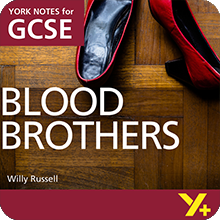Examiner's Notes
You assessed this answer as Grades 6–7.
Hover over the highlighted text to read the examiner’s comments.
Question: Read from ‘Mrs Johnstone: Well, y’might still be able to …’ to ‘… She exits with the shoes’ (Act One, pp. 8–9).
Write about the relationship between Mrs Johnstone and Mrs Lyons at different points in the play.
In your response you should:
- refer to the extract and the play as a whole
- show your understanding of characters and events in the play.
Although they seem friendly with each other, we know that Mrs Johnstone works for Mrs Lyons, cleaning her house. Mrs Lyons’s home is large and peaceful, and she speaks using Standard English; Mrs Johnstone’s house is loud and chaotic, and she uses a colloquial style of speech. When Mrs Johnstone comments on her ease at getting pregnant, she says, ‘’Ey, it’s weird though, isn’t it?’, which hints at her regional accent.
In this extract, Russell also suggests that the women have different beliefs when Mrs Lyons puts the new shoes on the table. Mrs Lyons laughs off Mrs Johnstone’s horrified reaction as ‘superstitious’. But Mrs Johnstone’s words, ‘You never know what’ll happen’, also cast a shadow on the conversation they’ve just had about babies. Mrs Johnstone’s confession that she’s ‘havin’ another one’ after Mrs Lyons has opened up about her difficulties conceiving exposes the biggest difference between them. This contrast is the driving force of the action and the relationship between the two women. In the first instance, it leads to the idea that Mrs Lyons should take Mrs Johnstone’s child, but in the long term it has a far greater impact.
Russell continues to contrast the women throughout the play. Mrs Johnstone is distraught when she has to give up one baby, saying ‘they’re a pair, they go together’. This emphasises the way she considers the needs of the twins. In contrast, Mrs Lyons is presented as harder: ‘I must have my baby. We made an agreement’. The incident further on in Act One, where Mrs Lyons objects that ‘If he needs picking up, I shall pick him up’, is used to suggest that Mrs Johnstone is a natural, warm mother who knows when a child needs attention, whereas Mrs Lyons lacks this intuition and is cold and distant. When she later threatens Mrs Johnstone with being ‘locked up’ her callousness is made clear. She also draws on ideas about fate and bad luck to warn Mrs Johnstone off, claiming that if ‘secretly parted’ twins learn of the other one’s existence, ‘they shall both immediately die’. Once again, this indicates Mrs Lyons’s cruelty and determination to use any means, including the superstition she once laughed at, to maintain her control over the other woman.
Russell extends the contrast between the warmth of Mrs Johnstone and Mrs Lyons’s coldness to comment on the effect this has on their family life. Mickey lives in a large family full of life and playing games, while Edward is seen to be lonely and isolated. The impact of these different upbringings is developed further once Edward has met Mickey. Edward is drawn to him and even says to his mother ‘I like him more than you’. Later, Edward tells Mrs Johnstone that he thinks she’s ‘smashing’. Mrs Johnstone gives Edward the locket with her picture inside, showing how close he has got to them both.
How the women’s relationship affects Mrs Lyons in particular is revealed by Russell as the play progresses. She develops an obsession about her son needing to stay away from Mickey, causing her husband concern to the point that he advises her to ‘see a doctor’. Her decline is further reflected in the language she uses later when she tells Mrs Johnstone: ‘I curse you. Witch!’
Finally, it could be argued that the tragic conclusion of the play is caused directly by Mrs Lyons’ developing bitterness, which leads to the ultimate breakdown in the relationship between the two women. It is Mrs Lyons, after all, who informs Mickey that Edward is with Linda. This leads to Edward and Mickey’s deaths and demonstrates how far the relationship has disintegrated.
